Input interpretation

N-hexadecane
Chemical names and formulas
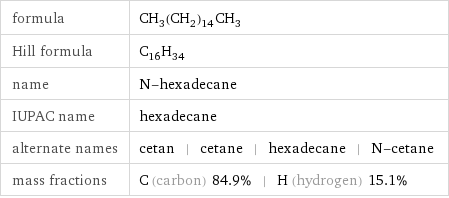
formula | CH_3(CH_2)_14CH_3 Hill formula | C_16H_34 name | N-hexadecane IUPAC name | hexadecane alternate names | cetan | cetane | hexadecane | N-cetane mass fractions | C (carbon) 84.9% | H (hydrogen) 15.1%
Lewis structure
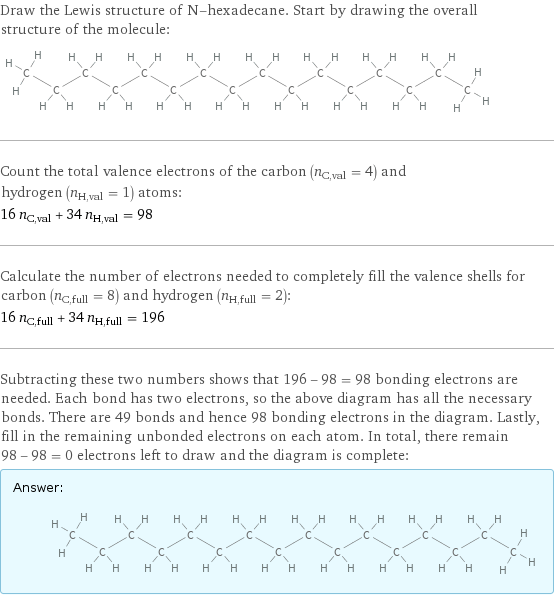
Draw the Lewis structure of N-hexadecane. Start by drawing the overall structure of the molecule: Count the total valence electrons of the carbon (n_C, val = 4) and hydrogen (n_H, val = 1) atoms: 16 n_C, val + 34 n_H, val = 98 Calculate the number of electrons needed to completely fill the valence shells for carbon (n_C, full = 8) and hydrogen (n_H, full = 2): 16 n_C, full + 34 n_H, full = 196 Subtracting these two numbers shows that 196 - 98 = 98 bonding electrons are needed. Each bond has two electrons, so the above diagram has all the necessary bonds. There are 49 bonds and hence 98 bonding electrons in the diagram. Lastly, fill in the remaining unbonded electrons on each atom. In total, there remain 98 - 98 = 0 electrons left to draw and the diagram is complete: Answer: | |
3D structure
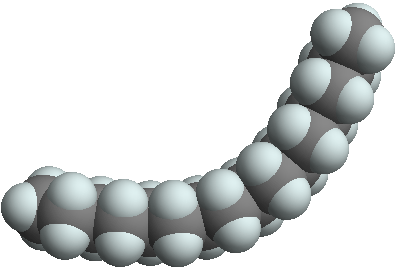
3D structure
Basic properties
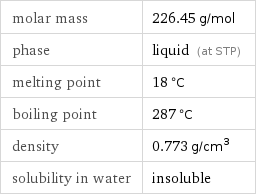
molar mass | 226.45 g/mol phase | liquid (at STP) melting point | 18 °C boiling point | 287 °C density | 0.773 g/cm^3 solubility in water | insoluble
Units

Liquid properties (at STP)
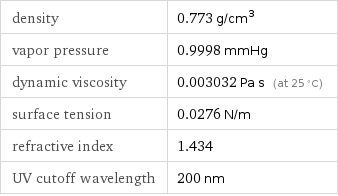
density | 0.773 g/cm^3 vapor pressure | 0.9998 mmHg dynamic viscosity | 0.003032 Pa s (at 25 °C) surface tension | 0.0276 N/m refractive index | 1.434 UV cutoff wavelength | 200 nm
Units
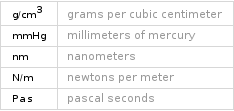
Thermodynamic properties
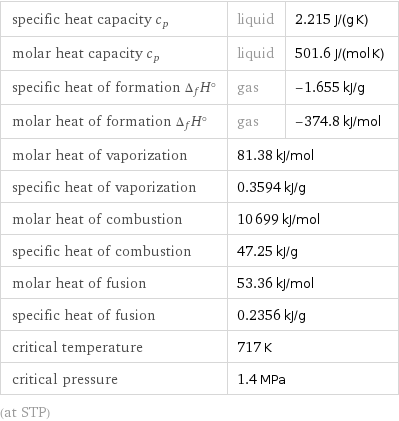
specific heat capacity c_p | liquid | 2.215 J/(g K) molar heat capacity c_p | liquid | 501.6 J/(mol K) specific heat of formation Δ_fH° | gas | -1.655 kJ/g molar heat of formation Δ_fH° | gas | -374.8 kJ/mol molar heat of vaporization | 81.38 kJ/mol | specific heat of vaporization | 0.3594 kJ/g | molar heat of combustion | 10699 kJ/mol | specific heat of combustion | 47.25 kJ/g | molar heat of fusion | 53.36 kJ/mol | specific heat of fusion | 0.2356 kJ/g | critical temperature | 717 K | critical pressure | 1.4 MPa | (at STP)
Chemical identifiers
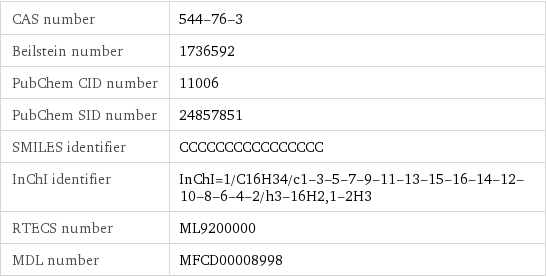
CAS number | 544-76-3 Beilstein number | 1736592 PubChem CID number | 11006 PubChem SID number | 24857851 SMILES identifier | CCCCCCCCCCCCCCCC InChI identifier | InChI=1/C16H34/c1-3-5-7-9-11-13-15-16-14-12-10-8-6-4-2/h3-16H2, 1-2H3 RTECS number | ML9200000 MDL number | MFCD00008998
NFPA label

NFPA label
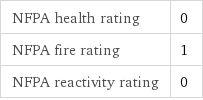
NFPA health rating | 0 NFPA fire rating | 1 NFPA reactivity rating | 0
Safety properties
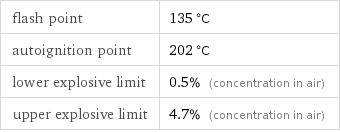
flash point | 135 °C autoignition point | 202 °C lower explosive limit | 0.5% (concentration in air) upper explosive limit | 4.7% (concentration in air)

DOT hazard class | 3 DOT numbers | 3295